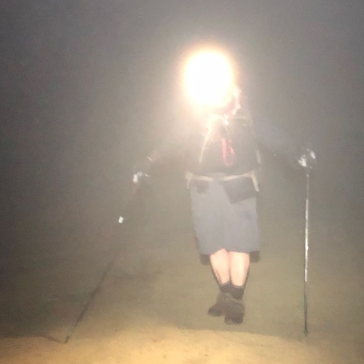I decided to head up to Deep Park Trail Thursday between the rains. I accompanied Bob who is a volunteer agh Monrovia Canyon Park. He said we were taking the fire road up and the trail down. In reading post and stories on line this is the less stressful way to do it and I am glad we did, The trail is in great condition even with the Bear scratching and mountain lion paw marks left in the fresh mud or the newts crossing the road. I am going to try starting from the trail one day but put a time turn around on it. Took us 7 hours overall mostly due to my picture taking and him telling me what the plants were called, should of written this down. Cool things about this hike was I saw my first spring at it beginning, saw my first newt and other stuff. As usual I cannot post pictures, one day I will figure it out, so here is a link
http://www.flickr.com/photos/unclericky ... 681076814/.
Rick
Deer Park Trail
-
mattmaxon

- Posts: 1137
- Joined: Mon Mar 24, 2008 12:48 pm
This photo prompted me to do what I've meant to do for years.
Look up the history of this type of pipe.
According to what I found this type of pipe was made from 1859 to 1900
This link opens a PDF on steeltanks .com with a paper on the history of steel water pipe
http://www.steeltank.com/Portals/0/pubs ... %20res.pdf
I would be interested in seeing any film, photos or other info on the equipment to do this type of pipe.
How the heck did they make this?
The riveting process requires "bucking" the head of the rivet Which in this case is way down inside the the pipe. Let alone making the pipe shape and holding it like that, make the holes and insert the rivets
Look up the history of this type of pipe.
According to what I found this type of pipe was made from 1859 to 1900
This link opens a PDF on steeltanks .com with a paper on the history of steel water pipe
http://www.steeltank.com/Portals/0/pubs ... %20res.pdf
I would be interested in seeing any film, photos or other info on the equipment to do this type of pipe.
How the heck did they make this?
The riveting process requires "bucking" the head of the rivet Which in this case is way down inside the the pipe. Let alone making the pipe shape and holding it like that, make the holes and insert the rivets
-
Elwood

- Posts: 621
- Joined: Fri Aug 15, 2008 5:23 pm
If you haven't done this already, check out pictures of the original Los Angeles Aqueduct. Many of the huge canyon-crossing siphons are constructed of riveted pipe section and still in service. I believe they managed to "deflate" one accidentally during construction.
-
mattmaxon

- Posts: 1137
- Joined: Mon Mar 24, 2008 12:48 pm
Yeah I've seen those photos many times and understand how they where made.Elwood wrote: Many of the huge canyon-crossing siphons are constructed of riveted pipe section and still in service.
Mostly with a "hydraulic" riveter, though some would have to be bucked by hand with some poor slob on the inside of the pipe while they peened the outside over.

The pipe in the photo is much smaller. Couldn't get the arm of a hydraulic riveter machine down inside the pipe.
Do not really understand how the pipes where joined either
